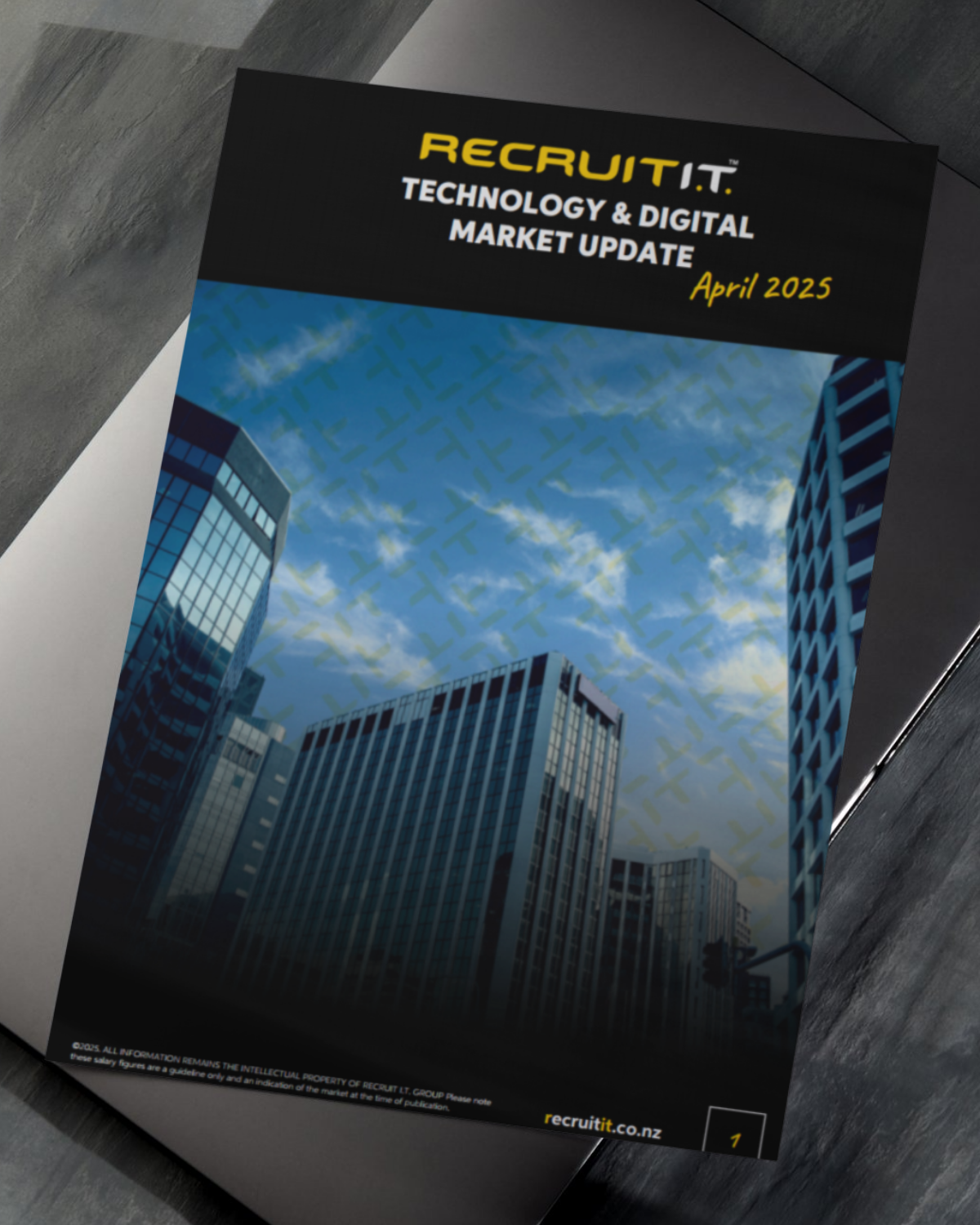October I.T. & Digital Market Update
WHAT'S BEEN HAPPENING?
Regional roundup
In Auckland, despite the current Covid outbreak and Level 4 and Level 3 lockdowns, the market is bustling, and we have seen a significant upsurge in work, with a dramatic increase in roles.
Burnout seems to be high on everyone's agenda in Auckland, with employers taking steps to ensure their staff are looked after during lockdown and while they are dealing with a high-intensity work schedule whilst working from home and dealing with family commitments.
The Wellington team has noted similar trends, with both government and private sectors still busy with projects, no slowdown during the lockdown, and clients continuing to onboard new starters.
Across the country, the market remains competitive, with candidate demand extremely high. Rates and salary expectations across our candidate pool are higher, and our teams see candidates presented with multiple offers and counter-offers.
Permanent is strong, with the demand for tech and digital talent at what feels like an all-time high. We have more people wanting to enter the contract market, with clients more than happy to wait four weeks for the right talent considering the current candidate shortages. Clients struggle to fill fixed term roles as they don't offer the security of pay that permanent or contract roles do.
With so much demand for talent, internal recruitment teams are still heavily reliant on the support of specialist technical and digital recruitment consultancies to work alongside them in identifying talent, and clients are also hiring their own internal recruiters to assist with hard to fill roles.
We see many recruitment agencies and employers alike pushing increasing generous referral schemes into the market to attract candidates.
A need for speed to secure top talent
When competition for specialised skills is so high, clients increasingly need to adapt their recruitment practices to ensure they are in the game, as most candidates actively looking for work are considering multiple opportunities.

Businesses that are still pursuing lengthy recruitment processes and moving too slowly find that shortlists evaporate with candidates securing roles with other companies before the first interviews, or during the process.
Some businesses have streamlined their recruitment processes to ensure they can offer key talent roles in a week or less, and we are seeing more clients moving to understand this demand and making sure they are putting processes in place to interview and make offers to candidates quickly.
As well as becoming quicker to move on candidates, some hiring managers have changed their processes to be less formal to be more attractive to candidates.
It is essential for hiring managers to keep close to their team and be conscious of how they are presenting themselves to candidates at interviews, as multiple offers to candidates are happening regularly, as well as counter-offers to keep candidates in their current roles.
We have been working to educate our clients on the importance of getting to candidates quickly. In reality, this means clients need to be more decisive - moving on contracting candidates within 24 hours and permanent people within 48 hours - not awaiting two weeks to shortlist.
Our team continuously focuses on a swift, efficient, and thorough process to secure top talent for your business without compromising quality or cultural fit. Our networks and relationships allow us to go direct to the talent without relying on job boards and effectively manage multi-offer or complex situations at speed.
A need for speed to secure top talent
When competition for specialised skills is so high, clients increasingly need to adapt their recruitment practices to ensure they are in the game, as most candidates actively looking for work are considering multiple opportunities.

We recommend that our clients establish a communication framework post-hire and during the notice period to maintain contact and engagement with the candidate. This could include being invited to teams video call drinks, joining the odd stand up where possible, and sending small lockdown gifts. The message here is to maintain the connection, so the excitement of securing the role carries through to them starting with the company.
Covid continues to bite so new solutions are required
The pain of border closure is deepening as the candidate pool in the country that is willing to move roles start to shrink steadily. We have numerous examples of candidates we have worked with who are now working for companies based in the US in full remote roles. Some crazy salaries are being offered, which makes it hard for local businesses to compete.
However, clients are becoming more open to engaging talent offshore, starting in their home country with a view to beginning the visa process when the borders open. We have several clients exploring offshore / outsource partners to bridge the skills gap while in-country resources are constrained.
Salaries scream skywards
Permanent salaries continue to rise to record levels due to the lack of talent available, and hourly contract rates are some of the highest in the market we have seen for a long time.
As demand continues to outstrip supply, we see Project Management, Business Analyst, Data, Engineering, Integration, Agile and Cloud related roles particularly affected with the market changing week to week. This is particularly problematic when clients are using old salary data to produce business cases.
As salary continues to trend upwards, counter-offers are way more aggressive in the current climate as employers offer significant increases to retain key staff. There needs to be more focus on meeting current market rates to retain staff rather than reacting to possible loss.
Candidates that were reserved about new opportunities last year are recognising the opportunity to earn more, and there seem to be more people considering new roles for more challenges or money.
Flexibility and work from home benefits are now the expected norm since Covid came to our shores, and we are seeing clients offering three days of work from home to entice people on top of high salary offers.
Although candidates are pushing for WFH, clients need to look closely at their culture when they have a large workforce doing this, ensuring collaboration is working well and employees have access to all the tools required to be successful. These aspects are important in ensuring good employee retention.
Contractor Chat
Many organisations have digital transformation and customer side programmes of work in flight, so the contract uplift is noticeable, and the market is booming.
On the flip side, contractor loyalty to seeing out a project has reduced significantly. We are seeing an increase in contractors resigning from roles mid-project, impacting organisations' ability to deliver projects on time.
Recruiters, internal recruitment teams, and hiring managers actively target contractors in contract and entice them away with higher rates and longer contract terms. This is not great for the contractor and their personal brand and also leaves many businesses in a difficult situation regarding delivery.
However, clients are willing to wait for candidates on four weeks notice in the contract market, meaning those looking to leave permanent employment to give contracting a go have more opportunities available.
Top talent requirements
Demand is high across the I.T. and technology industries in general, and we see shortages in all areas. However, we see increased demand for the following roles and skillsets:
- Business Analysts – both contract and permanent
- Project Management – indications that more new projects will soon be commencing
- Product Manager/Owner
- Data – across all levels
- Cloud AWS/Azure capability
- Architecture and Developers/Engineers across more modern tech stacks
We see a massive uplift in requirements for Cloud-based talent as vendors vie for these skillsets. This has been heightened with the emergence of some multinationals (Amazon and Google) trying to secure NZ-based remote staff.
Data, Security, Digital Customer Engagement, Cloud, CRM/ERP and Automation continue to be areas of high demand in the current market, coupled with BA, PM and Agile capability that has specific experience in these disciplines.
LOOKING AHEAD
The squeeze on talent will get tighter
Competition for candidates will remain until the borders open, and even likely beyond that. The likelihood of borders restrictions loosening in the next three months are slim, so the skills constraints will continue and deepen.
With limited MIQ bookings available, few kiwis are returning to NZ as they find it extremely difficult to get back here, so even the most enticing relocation packages are ineffective.

And locally, there are only so many times a candidate will change their job, so attracting talent from NZ businesses will also become more and more difficult.
Once the borders do open, immigration policy is likely to change will change, and new accreditation policy, increased minimum salaries and more stringent assessment of visa/residency application will be a reality.
Salary demands will bite
Candidate demands around salary will continue to increase, with many already seeking increases of at least 10% when looking to move to a new role. Increases in salaries and contract rates are great for candidates short term but may not be sustainable long-term for organisations.
To offset some of the salary demands, employers need to truly define their EVP and be more transparent about their business regarding strategy, projects, and career development. Position your company as the place to be for the next five years through sharing the journey and creating purpose. The decision to take a role needs to be bigger than just "more money."
Planning for Christmas
The next couple of months will be crucial for employers to secure talent before the Christmas break. Locking in talent this side of Christmas, bedding them in, and having them hit the ground running in the new year will be critical for all businesses in NZ.
In the project space
Government projects are still busy, particularly in the health sector, and we also see many large-scale infrastructure projects.
With major security breaches in several notable organisations over the last couple of months, we expect to see more focus here. Organisations are becoming more aware of the potential risk and implementing projects to improve systems and guard against future breaches.
We also see clients looking for candidates who have experience in newer technologies, which is likely to be a continuing trend in the project space.
International interest and focus on interns
We are likely to see more international companies targeting NZ talent to work for them remotely, as we have already seen Google and Amazon do in recent times.
These companies also target interns with lucrative programs, so New Zealand needs to up its game in this space. We expect to see larger graduate programmes being commenced, and we have seen international studies exploring whether internships should be paid or not – the resounding response was that they should.
A NOTE FROM OUR DIRECTORS
Some are hoping that borders opening up will solve our talent shortages and lead to expats returning. Post, the first lockdown in 2020, we didn't see this, and don’t expect any borders opening up and changing the current market.
This means recruiters and employers need to change the status quo, and we are seeing technology talent and recruitment transforming from a local economy to a global economy. This is led through the current pandemic, talent shortages, and improved technology and tools allowing distributed workforces to work effectively across the globe.
Employers need to think global to ensure they can remain competitive, whilst also not forgetting the very talent (graduates) that will be leading their companies in the future.
Investment into graduates needs to continue for all companies, and robust training and onboarding programmes will ensure you are future proofing your business with leaders of the future. Something that not enough companies are thinking about.
Despite the challenging environment that Covid is presenting in NZ, we have once again been blown away by the demand from our clients, and our teams across the country have been hectic with roles flooding in. As always, we continue to nurture our long-standing relationships and talent pools to ensure that despite the tight market, we are delivering the best recruitment solutions for our clients and candidates.
Stay safe out there!

All content copyrighted Recruit I.T. © All rights reserved | Terms & Conditions


